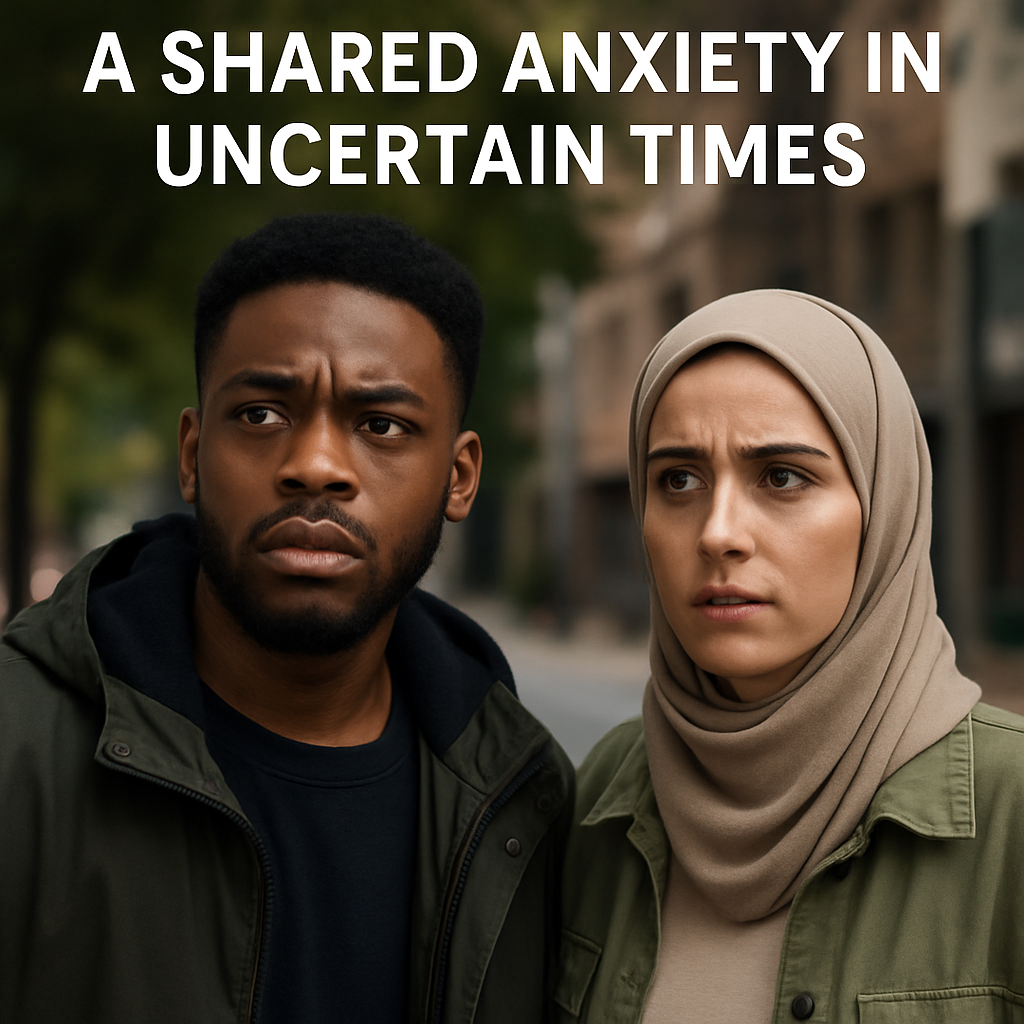By YBG Editorial Team | Pillar: Be – Cultural Identity & Mental Health
Introduction – A Shared Anxiety in Uncertain Times
In spring 2025, Greater Good Magazine published Gisselle Medina’s “How Can Immigrants Protect Their Mental Health Right Now?” a timely reflection on how policy turbulence and anti-immigrant rhetoric can turn daily life into a minefield of fear and hyper-vigilance.
For many Black American youth, that emotional landscape feels painfully familiar. Generations have learned to scan rooms for safety and monitor tone and movement to survive racism’s micro and macro currents. Though our histories differ, the psychic cost of constantly proving our right to exist is shared.
YBG’s Be pillar exists to bridge that space connecting Black youth and immigrant communities through honest dialogue, cultural healing, and collective mental-health literacy. This piece draws briefly from Medina’s reporting to reflect on how we can support each other and ourselves.
Shared Fears: Immigration and Racial Trauma
“One in five lawfully present immigrants say they or a family member have avoided daily activities … due to fears of encountering law enforcement.” — Greater Good Magazine, May 2025
Avoidance isn’t weakness; it’s a safety strategy. Black teens who take the long route home to dodge police presence understand the same instinct immigrant families feel when they skip appointments or stay off buses. Both groups internalize the message that safety requires shrinkage a quiet self-erasure to get through the day.
Fear becomes a shadow companion, conditioning body and breath. For Gen Z, who grew up with viral videos of violence and deportations, anxiety often registers as a baseline hum rather than a spike. Recognizing that shared somatic load is the first step toward solidarity.
YBG Action: Host “Fear Mapping Workshops” where youth literally map spaces that trigger anxiety — streets, schools, airports — and collectively reimagine safer routes and rituals for peace of mind.
Validation as a Healing Act
“As providers, the best thing we can do is hold space and validate what they’re going through … then move into safety planning.” — Greater Good Magazine, May 2025
Validation sounds simple but it’s revolutionary. For young Black Americans, gaslighting is common — being told they’re “too sensitive” about racism or should “let it go.” Immigrant youth hear the same after xenophobic remarks at school. Acknowledging pain without rushing to fix it is a radical form of care.
YBG Action: Create Validation Circles — peer sessions where participants practice listening and reflecting feelings instead of problem-solving. Each session ends with a “micro safety plan” so no one leaves unheld.
The Therapy Trust Gap
“Many immigrants avoid therapy out of fear that being ‘on the record’ could have consequences for their documentation status.” — Greater Good Magazine, May 2025
Mistrust of institutions cuts across diasporas. Black families carry their own memories of medical abuse and confidentiality breaches; immigrants worry therapy notes could jeopardize status. Both encounter therapists who lack cultural context, leading to misdiagnosis or minimization of racism’s impact.
Gen Z is pushing back — they want therapists who look like them, speak their languages, understand migration and microaggressions. Representation and training matter.
YBG Action: Develop a Culturally Competent Counselor Directory — a searchable tool linking Black and immigrant youth to therapists experienced in racial-trauma and cross-cultural care, including low-cost and virtual options.
Beyond Stigma: Normalizing Rest and Care
Both communities wrestle with a “survival ethic”: work harder, stay grateful, don’t show weakness. That ethic once kept families alive, but unchecked, it breeds exhaustion and silence. Millennials and Gen Z are rewriting that script through self-care language, therapy memes, and wellness collectives. YBG can amplify that moment by grounding it in community practice rather than consumer culture.
YBG Action: Offer monthly “Rest as Resistance” virtual retreats featuring Black and immigrant therapists, yoga instructors, and storytellers who frame rest as a birthright and collective strategy.
Building Bridges of Empathy
Solidarity begins with curiosity: asking what does safety mean to you? When Black and immigrant youth exchange answers, they find overlap — fear of police, language barriers in healthcare, media stereotypes. Understanding these intersections turns allyship into co-healing.
YBG Action: Launch a “Crossing Borders” story series where members submit short audio diaries about moments they felt unseen and how someone’s empathy shifted that moment. Curate episodes across diaspora regions to show common threads.
Closing Call – Healing Together
Mental health isn’t a zero-sum resource. When we learn from each other’s coping strategies, we expand collective resilience. Black youth understand systemic stress; immigrant youth embody adaptation under uncertainty. Together they can model a new culture of care that centers validation, safety, and shared freedom.
If fear crosses borders, so can healing. Join YBG’s upcoming peer healing circle or share your story at youngblackglobal.com/be.
Editorial Note
Portions of this essay include brief excerpts from “How Can Immigrants Protect Their Mental Health Right Now?” by Gisselle Medina, published May 14 2025 in Greater Good Magazine. Republished here under the publication’s Creative Commons license (CC BY-NC-ND 4.0). Original article available at greatergood.berkeley.edu.

Young, Black & Global (YBG) isn’t just a brand it’s a movement. We were born from a bold idea: that young Black people around the world deserve a digital space where they can be seen, celebrated, and connected.
Copyright © 2025 YBG | Privacy Policy | Terms & Condition